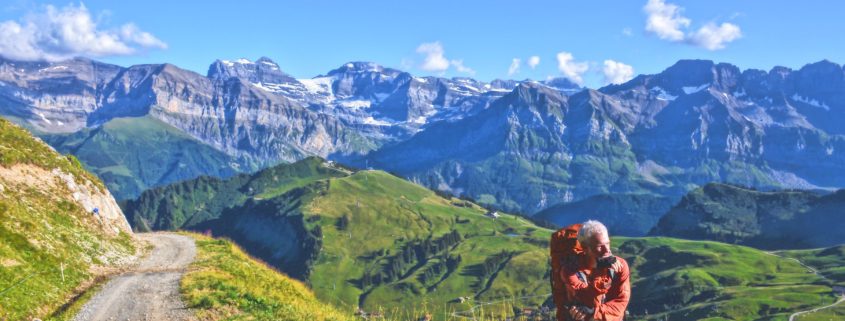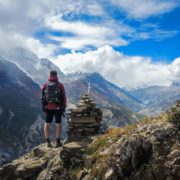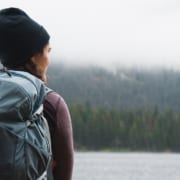5 Backpacking Tips for Seniors
Backpacking is for everyone. There’s no cut-off age. Even in your later senior years, you can enjoy incredible backpacking and hiking experiences with family members or groups of friends.
However, as you get older, you’ll undoubtedly start to notice that your body probably isn’t moving the way it once did. While that shouldn’t keep you from exploring the great outdoors, there are a few things you should keep in mind now that you may not have had to consider when you were younger.
Let’s take a look at some of the best backpacking tips for seniors so you can safely enjoy all of your backpacking experiences through your golden years.
1. Don’t Go Alone
While there’s something to be said for a solo hike, it can be risky for anyone. That risk becomes elevated as you get older. While planning and preparing are important, you can’t predict every little thing that might happen on the trail. You could lose some supplies, suffer an injury, or get lost somewhere.
While we’re living in a tech-forward world, digital devices don’t always work on the trail. Don’t rely on your smartphone to keep you “safe” on your own. Instead, plan your backpacking trips with other people.
2. Plan, Prepare, and Pack
Even if you can’t predict everything that will happen, it’s no excuse not to plan and prepare as much as possible. If you’re an avid backpacker, you probably have a mental checklist of everything you’ll need for the trail. However, it’s never a bad idea to double-check that you have everything you need and take into consideration any new items you should bring along just in case. Some of the basics include:
- Hygiene products;
- Appropriate clothing, extra items for changing weather, and proper shoes/boots;
- Any prescription medications;
- A first aid kit;
- A communication device.
It’s also crucial to make sure you pack enough food and water. As we age, our energy levels tend to drop. Packing nutrient-dense snacks and water for backpacking will keep you satiated and hydrated throughout your hike and give you a boost of energy when you need it most. Integrating some extra vitamins and supplements into your daily routine even before the hike can also make a big difference for active senior hikers, so you don’t burn out on the trail.
3. Be Mindful of Your Body
No one likes to admit that they’re “feeling their age,” but it happens. You don’t have to prove yourself to anyone when you’re planning a backpacking trip. Instead, choose to be mindful of your body. Ask yourself if you’re really up for a strenuous hike or camping trip.
How do you feel? Do you tire out quickly? Do you deal with aches and pains each day? If so, you might want to hold off on your trip until you’re able to build some stamina and train for it.
Even if you’re already on a backpacking adventure, check in with yourself frequently. Listen to your body when it tells you to take a break or slow down. While it can be tempting to push yourself to your own physical limits, that will only put you at a greater risk of injuring yourself.
4. Research Locations
It’s a good rule of thumb to do your research on any location you plan on hiking. This is not only a backpacking tip for senior hikers, but for all adventure seekers. Whether it’s a local spot or somewhere across the country, make sure you’re fully aware of things like:
- Terrain;
- Trail length;
- Common obstacles;
- Local wildlife;
- Weather forecasts.
Continuing to do your research, especially when it comes to weather conditions, is crucial right up to the day of your hike. Knowing as much information as possible about your hiking location will make it easier to pack properly, and mentally and physically prepare yourself for what’s ahead.
5. Talk to Your Doctor
Dealing with pre-existing conditions on hikes is something older individuals must think about. Some of the most common health concerns for seniors include:
- Respiratory diseases;
- Balance issues;
- Cognitive decline;
- Heart disease.
If you have any underlying health conditions, it’s a good idea to talk to your doctor before heading out on a backpacking trip. They’ll let you know if it’s safe to do, and can help you prepare by refilling your medications and offering suggestions on how to stay healthy.
Even minor conditions shouldn’t be ignored. For example, you should treat dry eye before gearing up. Dry eyes can cause a sensitivity to light and make your eyes feel like they’re burning. That’s the last thing you want when you’re spending all day outside. Taking care of these small-scale issues before you go will keep you comfortable, safe, and healthy on your hike.
Backpacking Tips for Seniors – Our Takeaway
As you age, your needs change. No matter how many times you’ve been backpacking in your life, don’t ignore those needs. Your main priority should always be to keep yourself safe and healthy, so you can continue to enjoy backpacking for many years. Keep these backpacking tips for seniors in mind as you plan and prepare for your next trip, and you’ll feel better about it every step of the way.
About the author











Leave a Reply
Want to join the discussion?Feel free to contribute!